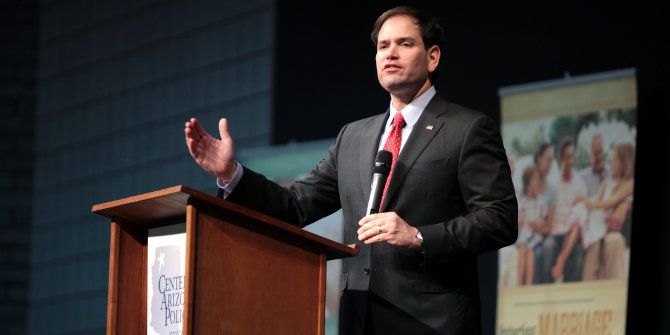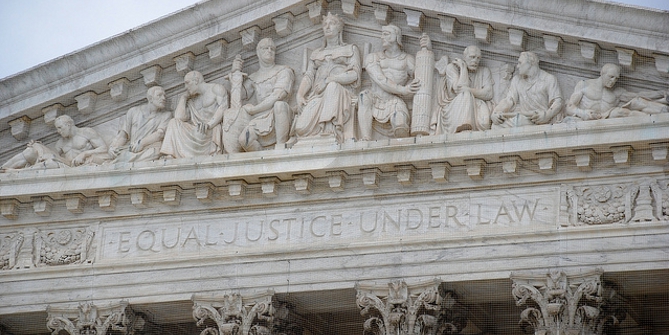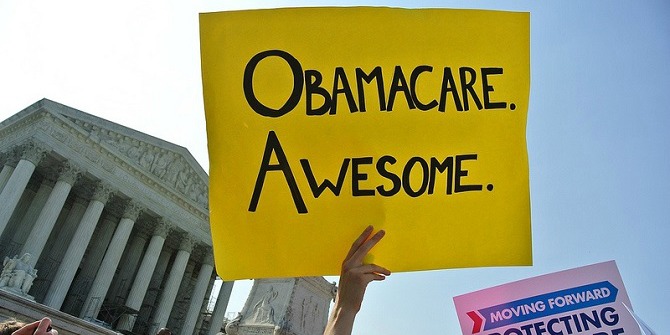USApp Managing Editor, Chris Gilson looks at the best in political blogging from around the Beltway. Our round-up of state blogs will follow on Saturday afternoon.
President Obama, the Democratic Party, and the GOP
This month is crucial for President Obama, writes Wonkblog, who preview three of the White House’s most important projects: the House’s expected vote on the president’s trade agenda, the Supreme Court’s decision on Obamacare, and the deadline for an agreement with Iran over its nuclear program. Delving into the Supreme Court and Obamacare, The Atlantic wonders on Wednesday if the President is trying to sway the Court, after he made comments that there is no reason why Obamacare’s federal exchanges should be overturned in the courts, and that the case should not have even been taken up.
The Daily Signal this week examines what they say is the ‘real trouble’ with Obama’s rhetoric. They argue that the President is better suited to fighting abstractions such as climate change than more specific threats such as ISIS in the Middle East.
Hit & Run is critical of a planned change by the Obama administration to which American workers are eligible for overtime pay. They say that by increasing the current $23,660 threshold to $52,000, the government is aiming to boost incomes, but might actually end up lowering employment. Still on the subject of jobs, Perrspectives writes on Monday that Obama has actually created six times more jobs than President George W. Bush did.
Moving over to the Republican Party, Outside the Beltway looks at the slow trend that is seeing the GOP become less socially conservative.
Elections and the road to 2016
Looking at the general GOP side of the presidential horse race, United Liberty says that if the party is to be beat former Secretary of State, Hillary Clinton (the Democrats’ likely nominee), then it needs to nominate someone reasonable, avoid the temptation to go negative, and ‘radiate youthfulness and vigor’. Clinton already has the GOP’s field of candidates in a difficult spot – Americablog comments that they have tried and failed to respond to her call last week for 20 days of nationwide early voting and automatic voter registration. FiveThirtyEight, meanwhile, looks at what Fox News isn’t saying about its upcoming GOP debate, and what determines which ten GOP candidates will be participating. Looking at some of those candidates more closely:
-

Florida Senator Marco Rubio Credit: Gage Skidmore (Flickr, CC-BY-SA-2.0) Wisconsin Governor Scott Walker won’t rule out another Iraq invasion (Crooks & Liars).
- Florida Senator Marco Rubio is channeling the rhetorical style of JFK (National Journal)…
- …even though he’s terrible with money (Get There).
- Former Senator, Rick Santorum had a *small* meeting in Iowa this week (FreakOutNation).
- Former Florida Governor, Jeb Bush, kicked off a European tour this week (The Atlantic)…
- …while his ‘non-existent’ campaign has had a few hiccups (Wonkblog)…
- …and may be panicking after discovering he is not liked by voters (Hit & Run).
- Is New Jersey Governor, Chris Christie, stealing from former presidential candidate, John McCain’s playbook (National Journal)?
Just at the GOP is looking at ways to beat Hillary Clinton, Political Animal looks at how the Democrats can win in 2016 – by staking out a variety of progressive issue positions that have broad support, and embracing these ideas that makes Republican counter spin unresponsive. Looking at the Democrats’ candidates more closely:
- This week Clinton endorsed the fight for higher minimum wages and expressed solidarity for those who are pushing for it to rise to $15 nationally (Wonkblog).
- Clinton shouldn’t worry too much about running a nationally unifying campaign, and should not try and target undecided voters, despite what some are saying (Crooks & Liars).
- Americablog looks at why Clinton and her husband have been such magnets for scandals in recent years.
- Townhall reckons that Clinton has a plan to ‘stuff the ballot box’ in 2016 by giving felons and non-citizens along with those who can’t prove their identities the vote.
- Moving on to someone who isn’t a Clinton, The Democratic Truth reports that Vermont Senator, Bernie Sanders has won 41 percent support in a straw poll of Wisconsin Democrats.
Government, the Beltway and Congress’ agenda
On Monday, The Atlantic covers the story that the FBI has been able to create a ‘small air force’ of surveillance planes in recent years. The planes have been carrying out both video and cell phone surveillance. They say that House members have been frustrated at the lack of transparency over the practices given that the president has recently signed a bill rolling back the bulk collection of phone records by the National Security Agency.
In 2012, the U.S, territory of Puerto Rico held a referendum where 44 percent of voters supported statehood. The Hill’s Congress blog looks at the historic inability of Puerto Rico’s statehood movement to gain an absolute majority.

This week saw an important decision from the Supreme Court – it held that Congress could not require the State Department to designate ‘Israel’ as the place of birth for U.S. citizens born in Jerusalem. The Volokh Conspiracy says that the decision is a win for the executive branch as its view has trumped that of Congress.
The 2016 campaign has already been fraught with accusations of campaign finance violations as undeclared but active candidates coordinate closely with their SuperPACs. Americablog reports Wednesday that the Chair of the Federal Election Commission (FEC), Ann Ravel has filed a petition with the FEC to request that it enforces campaign finance regulations.
Moving on to the Senate, Daily Kos writes this week that Majority Leader, Mitch McConnell (R-KY) has refused a Democratic request for a budget summit – which creates a fiscal standoff over the sequester spending limits set by the 2011 Budget Control Act.
On Friday the House was due to vote on whether or not to give President Obama trade promotion authority – which he would then use to push through the Trans-Pacific Partnership trade agreement. Hit & Run says that on the eve of the vote, the politics remain twisted, and that the House has approved the rules for debate, with eight Democrats joining the Republicans in voting for the measure. While the House did pass the trade promotion measure, it rejected an associated Trade Adjustment Assistance bill which would provide assistance for workers displaced by trade, says The Daily Signal. Since both bills must be passed to match up with the Senate’s version, President Obama’s trade agenda is now in limbo.
Foreign policy, defense and trade
For anyone who is worried about the U.S. ability to project its military power across the world, Outside the Beltway has two maps – one which shows which countries have American military bases, and one which shows where there are Chinese bases. Last week saw a massive hacking attack on the Office of Personnel Management, something that most officials suggest originated in China. The American Interest writes that the effects of the hack could be ‘exponential’ with the personal details of government employees stationed overseas potentially having been compromised.
On Sunday, The Daily Signal has an assessment of the future of the U.S.-UK special relationship, given the UK’s increasingly close, but fraught, relationship with the EU. They comment that because the U.S. is so friendly to the UK, the fate of the relationship rests with the UK.
This week also saw the Obama administration decide to send up to 500 additional troops to Iraq to train local forces to fight against ISIS. Hit & Run says that given that Congress’ 2002 authorization for the use of military force in Iraq has never been revoked, and that the U.S. didn’t pull out of the country entirely in 2011, the Iraq war never really ended. American Thinker meanwhile looks at the ‘strategic fog’ that has plagued U.S. politicians and generals since the end of the Cold War. They say that the country’s slow slide into strategic confusion probably began with the end of universal conscription and the beginning of an all-volunteer military.
Obamacare and health policy
In the next few weeks, the Supreme Court will announce its decision in the King v. Burwell case, which revolves whether or not the 2010 Affordable Care Act allows for tax credits for those who obtain health insurance from federal Obamacare exchanges. Red State writes Saturday that we should not cry for large health insurance companies if the Supreme Court rules against federal Obamacare subsidies. They say that health insurance companies have done very well out of Obamacare, and just as the government can give, it can also take away. On Wednesday, Crooks & Liars argues that the supreme irony of King v. Burwell is that not only will red states be the hardest hit if the subsidies are thrown out, but that it is the blue states which have been picking up most of the tab for them. The Daily Signal, meanwhile says that new data for 34 states shows that if Congress eliminated three costly Obamacare regulations, then premiums could drop by hundreds for those who have never gotten subsidies under Obamacare. No matter what, Daily Kos says, a majority of Americans want the Supreme Court to save the federal subsidies.

On Monday, Hit & Run looks at whether the ‘medical socialism’ of Obamacare is working. They say that many health insurance companies who sell coverage through the exchanges are requesting premium increases for 2016 of over 50 percent, with these likely to be a prelude to much larger increases in the future. Speaking of high costs, The Atlantic has a piece on hospitals that overcharge their patients by over 1,000 percent more than what the federal government thinks that the procedures should cost.
The economy and society
Why do people often lack trust in their government? Political Animal explores the roots of mistrust in government this week, something they say is especially a problem for Democrats. They say that a great deal of why people don’t trust government is down to the GOP’s strategy of sabotaging government’s reputation from the 1980s onward.
This week the news was dominated by coverage of the police’s use of excessive force in breaking up a pool party in McKinney, Texas, with a white officer using obscenities and force against young blacks. The Atlantic uses this as a springboard to discuss the racial history of U.S. swimming pools, which were frequently battlegrounds for desegregation in the 1950s.
The shale extraction revolution has led to plunging oil prices in the U.S. and elsewhere. Liberty Street Economics looks at whether cheaper oil has been good or bad news for the U.S. economy. They conclude that lower prices have had a modest stimulatory impact on the economy, but that these effects will have mostly dissipated by early next year. Staying on the oil industry, PoliticusUSA reveals on Tuesday that it benefits from more than $5 trillion in subsidies annually across the world. While low oil prices might be helping the economy, growth overall has been disappointing, at least according to Roll Call. They say that relatively high taxes are forcing companies to move their economic activity offshore, which in turn affects growth and jobs. Not only is U.S. economic performance lacklustre, employees are getting less done, writes Wonkblog. They say that recent solid job growth may only reflect that employers are hiring more staff because their workers are less productive and more are needed.
And finally…
This week Republicans in the House of Representatives tried to gut the Migratory Bird Treaty Act which protects bald eagles among other important birds, reports Crooks & Liars.
In the first three months of the year, a record 1,336 Americans renounced their citizenship, a record high, says The Lonely Conservative.
Wonkblog looks at the difference between twitter in the Beltway and twitter everywhere else.
Featured image credit: The White House
Please read our comments policy before commenting.
Note: This article gives the views of the author, and not the position of USApp– American Politics and Policy, nor of the London School of Economics.
Shortened URL for this post: http://bit.ly/1GzLqW4





